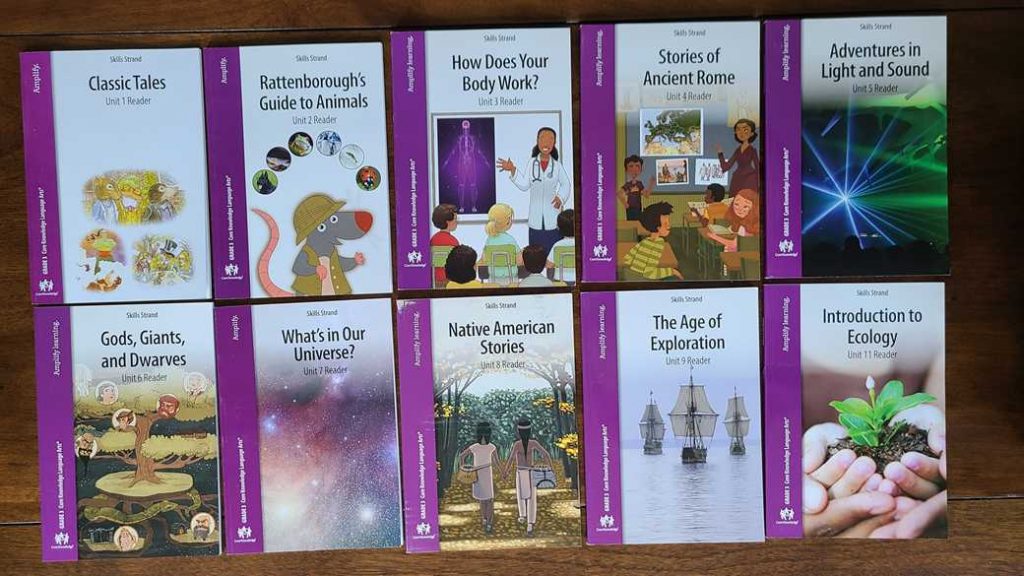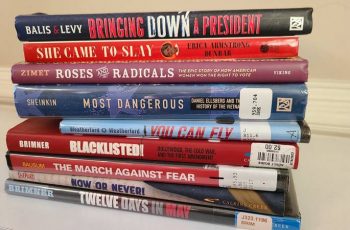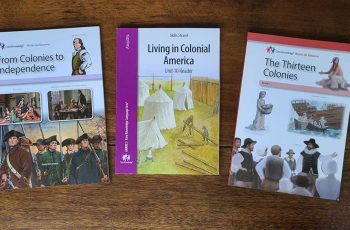
One of the most important features of the Core Knowledge curriculum is the focus on building a base of core content knowledge throughout both elementary and middle school. Unlike other curriculums, Core Knowledge takes a unique approach in the elementary grades and use the language arts curriculum as another opportunity to explicitly build your child’s knowledge and not in a random way—the knowledge-focused units for language arts are carefully coordinated so the topics weave into the knowledge the student is learning in the history and geography curriculum as well as the science curriculum. Consequently, the unit topics for the Core Knowledge Language Arts (CKLA) curriculum may seem a bit confusing–especially you’re a veteran homeschooler but new to the CKLA curriculum.
While some units for elementary school are clearly typical literature units like you’d expect to see in any language arts curriculum, some of the units will be focused on topics that will actively build your student’s knowledge of history, geography, and science.
Using a rich set of knowledge as the topic for the unit’s student reader as well as inspiration for lessons teaching traditional language arts skills is one of the things that makes Core Knowledge such an effective curriculum. Students benefit from increased knowledge as well as engaging and interesting content that ties to other concepts they learn during the school year.
Example: CKLA 5th Grade Unit 2: Early American Civilizations
Let’s look at CKLA 5th Grade Unit 2 as an example. The topic for this language arts unit is Early American Civilizations.
- The reader for the unit is focused on teaching the student about the earliest civilizations to inhabit the Americas. So instead of improving reading skills, reading comprehension, etc. using random literary excerpts, the student is actively building knowledge on an important historical topic.
- The grammar, morphology, punctuation, spelling, and vocabulary exercises in the unit will often draw on information from the reader. For example, sentences that are analyzed to learn grammar concepts may be tied to the information in the reader. Vocabulary and spelling words will also often align with the content they are learning.
- The knowledge learned in the unit is also used to teach composition skills. In this unit students are specifically working on paraphrasing and note taking skills as well as continuing to practice their skills for planning, drafting, and writing paragraphs to use in essays. Instead of having students choose a random topic for their composition exercises, students will use the knowledge they’ve learned in the unit. This has two big advantages. First, writing about information learned helps our brains analyze and retain the information. Second, by having students write about a topic they are immersed in (vs. something randomly or assigned or something they have to come up with), the student can focus all of their attention on learning the new composition skills—not on trying to find and learn about a topic so they can write about it.
CKLA Units for Grades K-5
For the elementary grades, each year has units that are literature-themed, social studies-themed, and/or science-themed. And remember, these unit topics are not random—the social studies and science topics covered in language arts strategically reinforce the topics your student will also be learning in the history and geography curriculum and the science curriculum.
Kindergarten CKLA Listening & Learning Curriculum
Traditional ELA/Literature-Themed Units:
- Unit 1: Nursery Rhymes and Fables
- Unit 3: Stories
- Unit 7: Kings and Queens
Social Studies-Themed Units:
- Unit 5: Farms
- Unit 6: Native Americans
- Unit 9: Columbus and the Pilgrims
- Unit 10: Colonial Towns and Townspeople
- Unit 12: Presidents and American Symbols
Science-Themed Units:
- Unit 2: The Human Body
- Unit 4: Plants
- Unit 8: Seasons & Weather
- Unit 11: Taking Care of the Earth
1st Grade CKLA Listening & Learning Curriculum
Traditional ELA/Literature-Themed Units:
- Unit 1: Fables and Stories
- Unit 3: Different Lands, Similar Stories
- Unit 9: Fairy Tales
Social Studies-Themed Units:
- Unit 4: Early World Civilizations
- Unit 5: Early American Civilizations
- Unit 10: New American Independence
- Unit 11: Frontier Explorers
Science Themed-Units:
- Unit 2: The Human Body
- Unit 6: Astronomy
- Unit 7: The History of the World
- Unit 8: Animals and Habitats
2nd Grade CKLA Listening & Learning Curriculum
Traditional ELA/Literature-Themed Units:
- Unit 1: Fairy Tales and Tall Tales
- Unit 4: Greek Myths
Social Studies-Themed Units:
- Unit 2: Early Asian Civilizations
- Unit 3: Ancient Greek Civilization
- Unit 5: The War of 1812
- Unit 7: Westward Expansion
- Unit 9: The U.S. Civil War
- Unit 11: Immigration
- Unit 12: Fighting for a Cause
Science Themed-Units:
- Unit 6: Cycles in Nature
- Unit 8: Insects
- Unit 10: The Human Body Building Blocks
3rd Grade CKLA Curriculum
Traditional ELA/Literature-Themed Units:
- L&L Unit 1: The Wind in the Willows
- Skills Reader Unit 1: Classic Tales
- Skills Reader Unit 4: Stories of Ancient Rome
- Skills Reader Unit 6: Gods, Giants, and Dwarves
- Skills Reader Unit 8: Native American Stories
Social Studies Themed-Units:
- L & L Unit 4: The Ancient Roman Civilization
- L & L Unit 6: The Viking Age
- L & L Unit 8: Native Americans Regions and Cultures
- L & L Unit 9: European Exploration of North America
- Skills Reader Unit 9: The Age of Exploration
- L & L Unit 10: Colonial America
- Skills Reader Unit 10: Living in Colonial America
Science Themed-Units:
- L & L Unit 2: Classification of Animals
- Skills Reader Unit 2: Rattenborough’s Guide to Animals
- L & L Unit 3: The Human Body Systems and Senses
- Skills Reader Unit 3: How Does Your Body Work
- L & L Unit 5: Light and Sound
- Skills Reader Unit 5: Adventures in Light and Sound
- L & L Unit 7: Astronomy: Our Solar System and Beyond
- Skills Reader Unit 7: What’s in Our Universe?
- L & L Unit 11: Ecology
- Skills Reader Unit 11: Introduction to Ecology
4th Grade CKLA Curriculum
Traditional ELA/Literature Themed-Units:
- Unit 1: Brown Girl Dreaming (a memoir by Jaqueline Woodson)
- Unit 3: King Arthur and the Roundtable
- Unit 4: Listen My Children (poetry)
- Unit 8: Treasure Island
Social Studies Themed-Units:
- Unit 2: The European Middle Ages
- Unit 6: The American Revolution
- Unit 7: The U.S. Constitution
Science Themed-Units:
- Unit 5: Geology
5th Grade CKLA Curriculum
Traditional ELA/Literature-Themed Units:
- Unit 1: They Call Me Güero: A Border Kid’s Poems
- Unit 3: Don Quixote
- Unit 5: A Midsummer Night’s Dream
- Unit 7: Poetry
- Unit 9: The Science of Breakable Things (novel study)
Social Studies Themed-Units:
- Unit 2: Early American Civilizations
- Unit 4: The Renaissance
- Unit 6: The Reformation
- Unit 8: Native Americans
A Quick Note on the CKLA Middle School Curriculum
While still be released, one of the big shifts you’ll see in the CKLA curriculum for grades 6-8 is that almost all units are literature and/or poetry focused. Units are still wrapped around the literary work forming the unit topic and reinforced with skill-based instruction and exercises. You will note in the unit list above for grade 5, you can see this transition to being more heavily focused on literary works vs. social studies and science knowledge within the CKLA curriculum. The increased focus on reading, discussing, and analyzing literary works lays important groundwork for high school.
The Core Knowledge Foundation is a non-profit organization and has generously made their curriculum free to download. If you are able to, please consider making a donation to support their ongoing curriculum development efforts.
This post may contain affiliate links. This means if you click on a link and purchase an item, we will receive a small affiliate commission at no extra cost to you. These small commissions help offset the costs of producing and hosting this content.
Core Knowledge, CKLA, CKHG, and CKSci are registered marks of the Core Knowledge Foundation
Amplify is a registered mark of Amplify Education, Inc.
MEP Math has been made available through the Centre for Innovation in Mathematics Teaching

